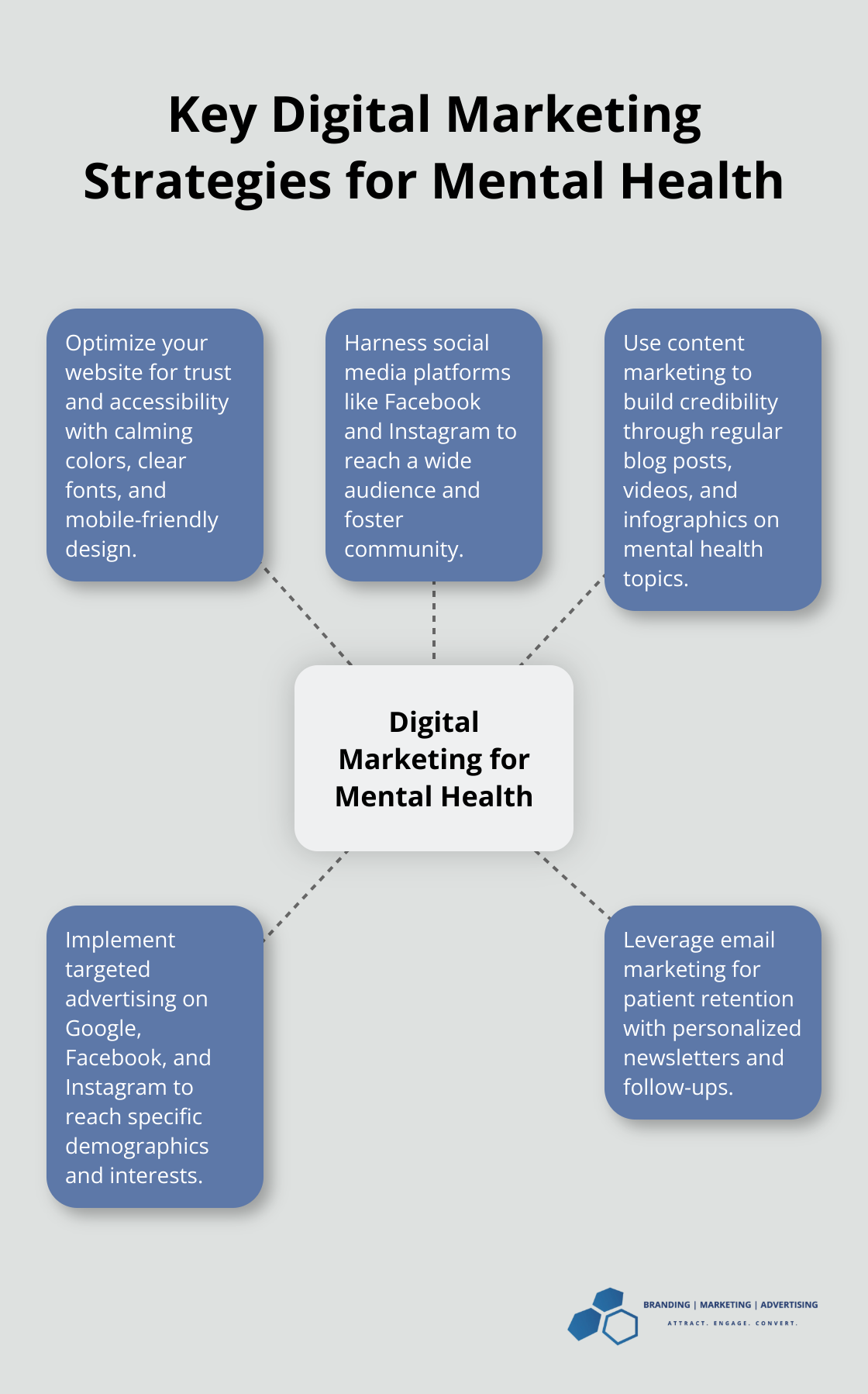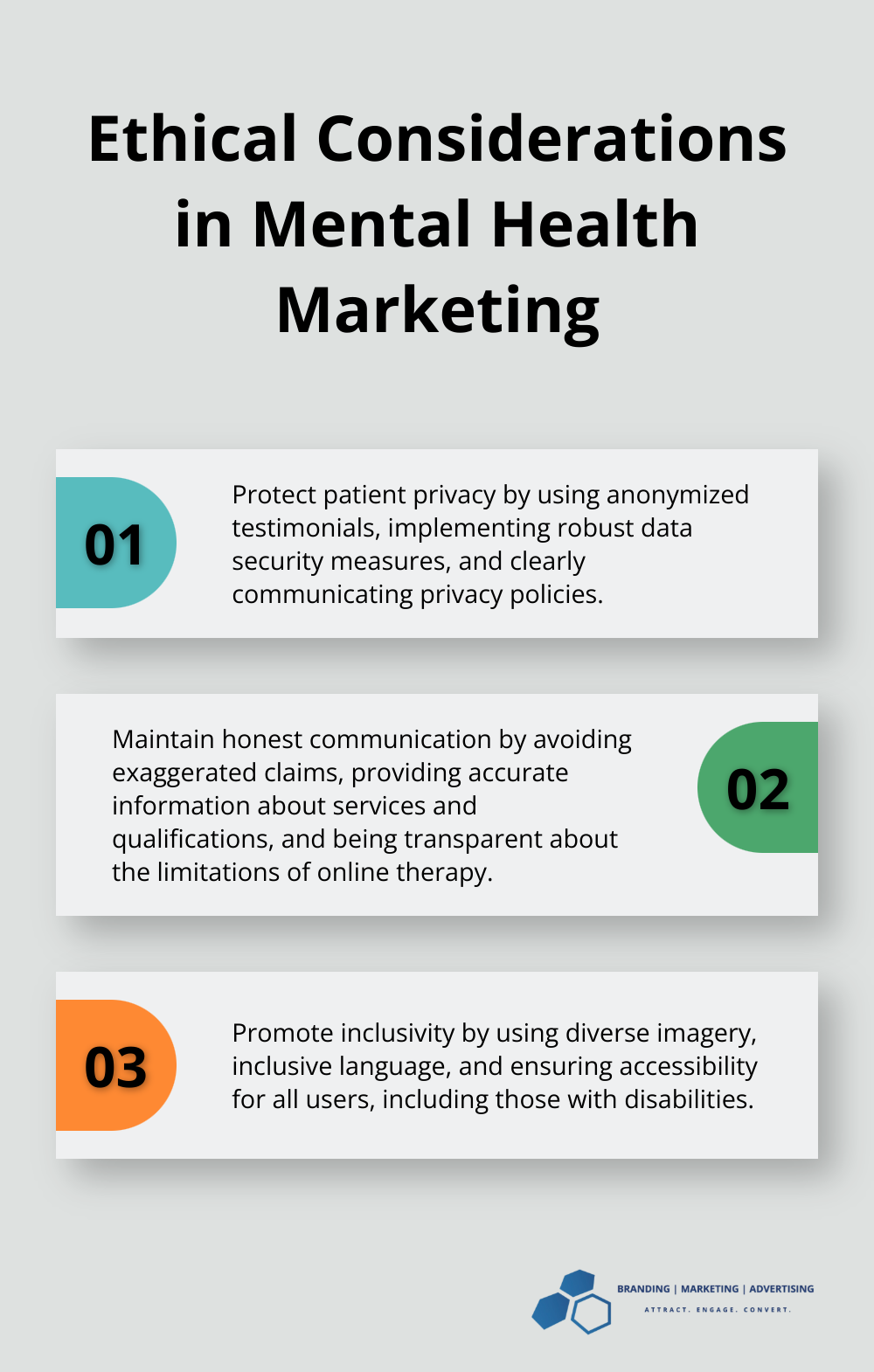Mental Health Marketing: Strategies for Digital Success
Mental health digital marketing has become increasingly important in today’s connected world. At Branding | Marketing | Advertising, we understand the unique challenges and opportunities this field presents.
Our blog post explores effective strategies for mental health professionals to establish a strong online presence while maintaining ethical standards. We’ll guide you through leveraging digital platforms to reach those in need of support and build trust with potential clients.
How Digital Marketing Reshapes Mental Health Services
The Digital Revolution in Mental Health Awareness
Digital marketing transforms the mental health landscape. Social media platforms become powerful tools for spreading awareness. More than one in five U.S. adults live with a mental illness (59.3 million in 2022; 23.1% of the U.S. adult population). This statistic underscores the importance of reaching potential clients online.

Successful campaigns leverage hashtags and influencer partnerships to normalize conversations about mental health. The #RealConvo campaign by the American Foundation for Suicide Prevention garnered millions of impressions, demonstrating digital platforms’ power in breaking down stigma.
The Importance of Digital Marketing for Mental Health Services
A strong online presence is essential for mental health professionals in today’s digital age. A survey by the American Psychiatric Association (APA) found that by June 2020, 85% of 500 surveyed American psychiatrists were using telepsychiatry. This statistic highlights the growing acceptance of online therapy options and the need for mental health providers to adapt their marketing strategies.
Digital marketing allows for targeted outreach, connecting mental health professionals with specific demographics or individuals seeking particular types of support. For example, Google Ads can reach people searching for “anxiety counseling near me,” potentially increasing new client inquiries by 30%.
Navigating Unique Challenges and Opportunities
Marketing mental health services presents distinct challenges. Privacy concerns and the sensitive nature of mental health issues require a delicate approach. Patient confidentiality must be prioritized in marketing efforts, ensuring all content and campaigns comply with HIPAA regulations.
These challenges also present unique opportunities. The digital space allows for the creation of safe, anonymous environments where individuals can seek information without fear of judgment. Mental health professionals can develop informative blog posts and video content that address common concerns, providing value to potential clients before they book an appointment.
Innovative Strategies in Mental Health Marketing
One effective strategy involves the use of chatbots on mental health websites. These AI-powered tools provide immediate responses to basic inquiries, offering a first point of contact for individuals who might hesitate to reach out directly. A recent study showed that 69% of consumers prefer using chatbots for quick answers, making this a valuable addition to any mental health marketing strategy.
Successful mental health marketing in the digital age requires a balance of sensitivity, innovation, and strategic thinking. The right digital tools and platforms can help mental health professionals reach more people in need and play a role in destigmatizing mental health issues on a broader scale.
As we move forward, it’s clear that digital marketing will continue to play a pivotal role in shaping the future of mental health services. The next section will explore specific strategies that mental health professionals can implement to create a strong and effective online presence.
How to Dominate Digital Marketing for Mental Health
At Branding | Marketing | Advertising, we’ve witnessed the transformative power of effective digital marketing for mental health practices. Let’s explore the strategies that yield the best results in this sensitive field.
Optimize Your Website for Trust and Accessibility
Your website often serves as the first point of contact for potential clients. It must convey professionalism, warmth, and accessibility. Start by ensuring your site loads quickly – 70% of users discontinued use within the first 100 days. Use calming colors and clear, easy-to-read fonts. Include prominent calls-to-action (CTAs) for booking appointments or accessing resources.
A mobile-friendly site is essential. Implement click-to-call functionality on every page to facilitate easy contact for mobile users.
Harness the Power of Social Media
Social media platforms prove invaluable for mental health marketing. They allow you to reach a wide audience and foster a sense of community. Facebook remains the most popular platform, with 98% of healthcare marketers using it. Instagram, with its visual focus, can effectively share inspirational content and patient stories.
Post regularly and engage with your followers. Share a mix of educational content, personal insights, and practice updates. Use relevant hashtags like #MentalHealthAwareness or #TherapyTips to increase visibility.
Content Marketing: Your Key to Credibility
Content marketing builds trust and establishes your expertise. Create blog posts, videos, and infographics that address common mental health concerns. For example, a blog post on “5 Ways to Manage Anxiety” can provide value to potential clients while showcasing your knowledge.
Try to publish new content at least once a week. According to HubSpot, companies that blog 11+ times per month get 4x more leads than those that don’t blog at all.

Targeted Advertising for Immediate Impact
While organic strategies matter, paid advertising can provide immediate visibility. Google Ads allow you to target specific keywords like “therapist near me” or “depression treatment.” The average cost-per-click for health and fitness ads is $4.71, making it a cost-effective option for many practices.
Facebook and Instagram ads offer detailed targeting options based on demographics, interests, and behaviors. This allows you to reach potential clients who may hesitate to search for mental health services directly.
Leverage Email Marketing for Patient Retention
Don’t overlook email marketing. It nurtures relationships with existing clients and re-engages past patients. The average open rate for healthcare email campaigns is an impressive 41%.
Send regular newsletters with mental health tips, practice updates, and resources. Personalized follow-up emails can increase client retention and satisfaction.
The implementation of these strategies can create a strong digital presence that attracts and retains clients. Consistency plays a key role in digital marketing. Regular review and adjustment of your strategies based on performance metrics ensure ongoing success.
As we move forward, it’s important to consider the ethical implications of marketing mental health services. The next section will explore how to balance promotional efforts with the sensitive nature of mental health care.
Ethical Marketing in Mental Health: Balancing Promotion and Responsibility
Protecting Patient Privacy
Patient confidentiality stands as the cornerstone of mental health marketing. We never use real patient stories or images without explicit consent. Instead, we create composite case studies or use stock images to illustrate points. All testimonials are anonymized, using only initials or first names with permission.
When we collect data through website forms or email subscriptions, we implement robust security measures. We use SSL encryption and comply with GDPR and CCPA regulations. Our privacy policies are clear and easily accessible, detailing how we use and protect client information.
Honest Communication
Transparency builds trust. We avoid making exaggerated claims about treatment outcomes. Instead, we provide accurate information about services, qualifications, and evidence-based practices. For example, rather than promising to “cure depression,” we might say, “Our cognitive behavioral therapy techniques have helped many clients manage depressive symptoms.”
We’re also upfront about the limitations of online therapy. While teletherapy has proven effective for many, it’s not suitable for all conditions or situations. We clearly communicate when in-person treatment might be more appropriate.
Educational Content vs. Promotional Material
We try to maintain a balance between educational content and promotional material. This approach positions mental health professionals as trusted experts rather than salespeople.
Our blog posts cover a range of mental health topics, from stress management techniques to recognizing signs of anxiety. We include calls-to-action, but they’re subtle and non-intrusive. For instance, at the end of an informative article about depression, we might add, “If you’re struggling with these symptoms, our team is here to help. Book a consultation to learn more.”
Promoting Inclusivity
Mental health issues affect people from all walks of life. Our marketing materials reflect this diversity. We use inclusive language and imagery that represents various ages, ethnicities, and gender identities. We’re mindful of cultural sensitivities and avoid stereotypes or stigmatizing language.
We also address accessibility. Our websites are designed to be navigable for users with disabilities (including those using screen readers). We provide closed captions for video content and transcripts for podcasts.
These ethical guidelines help mental health professionals build trust, attract clients, and contribute positively to public discourse on mental health. Ethical marketing isn’t just about following rules-it’s about creating a safe, welcoming environment for those seeking help.

Mental health marketing strategies can help improve visibility, build trust, and drive appointments online for those struggling to get more patients.
Final Thoughts
Mental health digital marketing presents unique challenges and opportunities in today’s digital landscape. The strategies we discussed form a comprehensive approach to reach those in need of mental health services. These tools allow mental health professionals to extend their reach, build trust, and help more people while maintaining ethical standards.
The future of mental health services in the digital realm appears promising. Increasing acceptance of teletherapy and growing mental health awareness suggest a continued need for robust online presence and engagement. As technology evolves, we expect new opportunities for personalized outreach and support (while maintaining the human touch at the core of effective mental health services).
Mental health professionals who want to enhance their digital presence and reach more individuals in need can benefit from expert guidance. At Branding | Marketing | Advertising, we create tailored digital marketing strategies for mental health services, ensuring ethical practices while maximizing online visibility and engagement. Our approach helps destigmatize mental health issues and provides crucial support to those who need it most.












